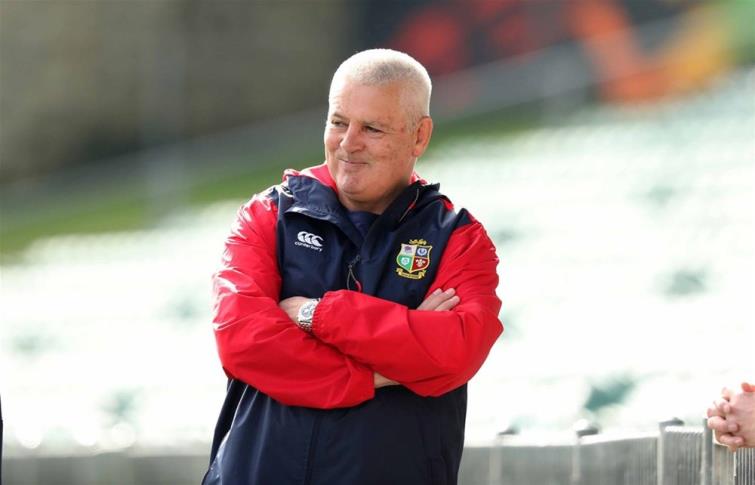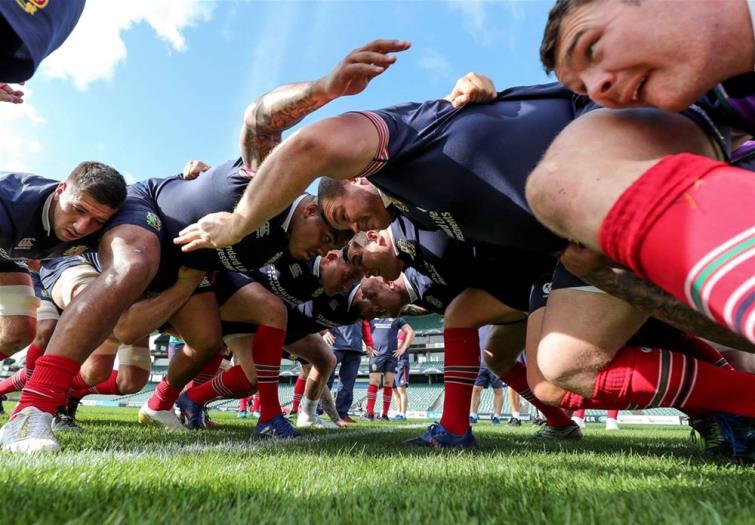Why the Lions and Gatland must throw caution to the wind in New Zealand

PHOTO:
Warren Gatland relishing the huge challenge against his native All Blacks
IT is the most enticing test series in rugby union.
The British and Irish Lions, the ultimate in terms of selection for any player from our shores – against the most fabled and legendary rugby loving nation of them all.
Tours to South Africa and Australia have notoriously brought their own challenges, their own unique traditions, and their own memories of glory or heartbreak in ample measures.
But neither, quite live up to the prospect of taking on the All Blacks in their own backyard. History, both recent and of distant past, tells us Warren Gatland’s side have a mountain to climb.
New Zealand remain firmly established as the No 1 test playing nation in the World, and a land where the Lions have triumphed just once.
It is no coincidence that many of the names involved in that historic 1971 series, none more so than the skipper Willie John McBride, will remain etched as Lions legends for evermore.
It is not impossible for Gatland and his 41-man squad to follow up their triumph in Australia four years ago with what would be an admittedly more creditable series success in New Zealand.
But to defy their justifiable tag of underdogs they will need bravery and boldness in abundance, and I’m not just talking about the players.
This is not a series where the head coach and his staff can go with tried and trusted, can set out to contain and control, or obsess with the now infamous ‘Warren-ball’.
It was Jim Telfer, instrumental as forwards coach when the Lions won against the odds in South Africa in 1997, who famously said that he likened past touring parties to the British and Irish going abroad on holiday, as they refused to accept change.
It’s a warning that the notoriously stubborn Gatland must take heed of. The All Blacks have moved on, not to mention ahead, of the era where size and power were the dominant features in a successful international side.
The team that turned up on British shores to win the 2015 Rugby World Cup were considerably leaner, more mobile, and ultimately more skilful than those who failed to stop them.
And if the tourists turn up with a plan to simply overpower their hosts, Steve Hansen and his side will see it coming a mile off. New Zealand will hurt the Lions in all three tests regardless of plans and tactics.
The likes of Beauden Barrett, Ben Smith, and Israel Dagg, not to mention skipper Kieran Read and his pack who can seamlessly slip into three quarter berths – have too much quality not to.
What the Lions must do, as Ireland did so famously that surreal night in Chicago, is be prepared to throw caution to the wind and hurt them back.
That would mean of course, Gatland reverting away from type, and furthermore, the tactics that have seen his Wales side become stale and predictable for much of the past two years.
He has six games to mould a side prepared to play with pace and intensity, with width, and an air of innovation and unpredictably.
He has to be prepared to take on the World’s best, and ultimately beat them, at their own game.
The old school boys on the bar stools may not thank me for this next comment – but keeping it up the jumper and trying to grind out a 9-6 nail biter will not cut it come the first test in Auckland on June 24th.
And nor can the Lions be conservative in selection. Players must be picked on form not reputation, and tour displays must take precedence over tour experience.
Forget the endless ‘Lions XV’ selections that have dominated social media and rugby related discussions this past 12 months, come that already critical night in Auckland, the tourists need a team with momentum and buoyancy.
No player between now and then should be assured a place, and that includes Sam Warburton.
The question is, will Gatland, a man who seemingly cares little for revolutionary risk taking, be prepared to alter his own rugby philosophy and beliefs on the grandest stage of them all?
If not, a harrowing reminder of what the All Blacks can do to you can be found 12 years back in time.
In 2005, Sir Clive Woodward, the then England World Cup winning coach, arrived in New Zealand apparently convinced he had the personnel to topple Dan Carter and co.
Sir Clive, who two years previously cemented legendary status by leading England to Rugby World Cup glory, had apparently left no stone unturned in his quest to further enhance his coaching legacy.
To say what followed was disastrous, would be a ludicrous understatement.
The touring party was very much split into two from the start – the test match elite kept separate from the midweek dirt trackers.
Players so pivotal to his 2003 success were re-paid with test places, most notably Jonny Wilkinson, who for all his undeniable quality – had barely touched a ball in two years since that incredible night in Sydney.
On the contrary, too many players were cast aside before the plane had even landed.
The style that had won England the World Cup was already outdated, and by the time Sir Clive realised, following a first test mauling in Christchurch, the mass panic that prompted wholesale changes in the second test produced a team disjointed and disorganised.
You don’t need me to tell you the rest. Perhaps one of Gatland’s strengths is he will care little for what has gone before him.
But he could do far worse than relate to that 2005 tour in his attempts to create a squad that is unified, whilst at the same time motivated and fiercely competitive with one another for test places.
On that note, it was heartening to hear Lions manager John Spencer say the squad would embrace New Zealand culture over these coming weeks. In an era where professional players are wrapped in cotton wool, with every step both on and off the field monitored, the Lions must not forget the ethos of what they are about.
Taking on the responsibility of visiting schools, engaging with the public and respecting local traditions, creates an aura and indeed a harmony that makes a Lions trip so unique and special.
And of course, how things do pan out between now and the third and final test on July 8th will grip our rugby public with the same expectation, fervour, passion, and fixation as a Lions tour invariably does every four years.
But whilst long gone are the days of 99 calls, kangaroo courts, and the up close and personal documentaries that signified the amateur tours of days gone by – certain aspects of the four nations coming together will never change.
Towns in New Zealand will be draped in red, and rivals home nation fans both on tour and back home will sing each other’s songs and wear the same shirts – and will share emotions together varying from agony to ecstasy.
Work bosses will raise their eyebrows as employees call in sick or attend sudden midweek morning appointments, landlords will be rushed off their feet from 8am, and local cricket captains will be left wondering whilst a host of players are either playing anebriated or simply unavailable.
And those on social media who aren’t rugby fans, might as well log out of their accounts for a month or two.
For the Lions are a rare breed that come out once every four years. And when they do, there is nothing else in rugby union quite like it.

PHOTO:
The British and Irish packs getting to know each other in a training session in Auckland